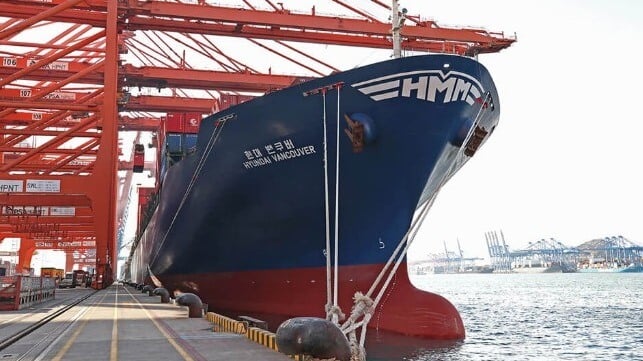HMM Makes $1 Billion Play in Bulkers to Diversify Away from Containers

With the well-publicized negative outlook for the container sector expected to continue through 2024 and possibly in 2025 or beyond, South Korea’s HMM is pushing forward with a strategy outlined in 2022 to expand and diversify its operations. In an unusual move compared to many of its peers, the South Korean carrier is moving aggressively into bulk shipping which analysts see as a step to protect against the weakness in the container market.
The predecessor company Hyundai Merchant Marine had been a larger operator in the bulk carrier segments with reports that 40 percent of its operations were in the segment in 2010. However, when the company experienced financial troubles mid-decade, it sold its bulker operations and its LNG carrier businesses to improve liquidity as part of the recapitalization that also saw a government bailout in the form of investments from the Korean Development Bank and Korean Ocean Corporation. The company was able to retain its liquid bulk operations with large crude oil tankers but had agreed not to handle cargoes such as iron ore, coal, and LNG so as not to compete with the operations it sold.
HMM in a stock exchange filing on October 27 reports that it has entered into a large new deal for bulk carriers. It is a long-term contract for four vessels running for 16 years from September 2026 through the end of 2042. It is a large deal for approximately $954 million, valued at current exchange rates. The unidentified customer has the option of extending the deal five years and the vessels can also be acquired at the contract partner’s choice of 10 or 15 years from the start date.
In July 2022, HMM outlined a five-year strategy plan which they said would include expanding its bulk fleet. At the time, they reported having 29 bulkers saying the target was to grow to 55 ships. The plan called for a 90 percent increase in capacity by 2026.
While much of the attention has been on growth in container shipping, including an order by HMM valued at $1.1 billion in February 2023 for nine methanol-fueled containerships, the Korean Economic Daily reports HMM also has quietly added six bulk carriers to its fleet this year. They highlight that the company plans to introduce 11 more next year to reach its target of 55 ships.

that matters most
Get the latest maritime news delivered to your inbox daily.
As part of the diversification, HMM also ordered three vehicle carriers to be built in China. It will be the first time the company has been in this sector since selling its PCTCs in 2002. In August, the company also reported that it had ordered four new multi-purpose heavy-lift ships to be built in China.
The company is continuing to execute on its strategy while its future ownership remains undermined. The two state-run financial institutions last month converted large portions of their bonds and warrants to stock as the next step in the plan to sell controlling interest in HMM. The previously released schedule for the bidding process targeted selecting the preferred bidder in November, but bank executives had also told the media that it would have to be the right buyer with the financial strength to pursue HMM’s growth. They noted that the banks could decide to continue to hold their investment in HMM until the container market rebounds.
